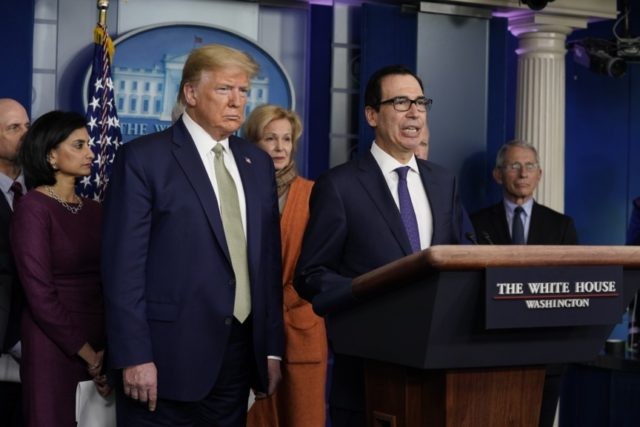The Trump administration’s plan for ‘stage 3’ of economic rescue measures includes two rounds of payments to Americans, each in an aggregate amount of $250 billion.
The plan calls for payments to be distributed to individuals on April 6 and May 18, according to a Treasury Department memo obtained by the Washington Post‘s Heather Long.
Payment amounts would be tiered according to income, presumably falling for individuals with higher incomes. The plan calls for payments to go to “individual taxpayers,” likely an indication that the government would use tax rolls and the Internal Revenue Service to distribute money and determine which Americans are eligible for which amounts.
Some advocates of emergency payments have criticized attempts to ‘means-test’ the program, saying it would add complexity, discourage participation, and might short-change individuals whose income has changed drastically because of the coronavirus.
Others, including the editorial page of the Wall Street Journal, have raised concerns about the government issuing checks to wealthy individuals who do not need assistance.
On Tuesday, Treasury Secretary Steven Mnuchin said he opposed extending the payments to people “who earn a million dollars.”
The memo also says the payments would be linked to family size, addressing concerns of some pro-family advocates who pointed out a program that paid a flat fee to households or taxpayers would penalize those with large families. The U.S. tax code generally allows taxpayers to set aside more of their income for household support for each dependent family member.
The memo also outlines a $300 billion plan to aid small businesses and their employees through a business interruption loan program. These loans would be made by financial institutions and backed by the federal government for amounts up to 100 percent of 6 weeks payroll, capped at $80,000 annual salary per employee.
Employers would not be allowed to lower wages under the program.
The memo includes $200 billion of aid to businesses thrown into distress by the coronavirus outbreak, with $50 billion set aside for the airline industry.
The plan would authorize the Treasury to backstop the money market mutual funds with a guarantee program, a step the government undertook during the financial crisis. Money market funds are used by many Americans as an alternative to savings accounts and the fund much of the short term credit used by U.S. businesses and financial institutions.
The backstop is meant to prevent a “run on the bank” against these funds, much the way deposit insurance is aimed at discouraging the more traditional bank run of the sort probably familiar to most Americans from the movie It’s a Wonderful Life.

COMMENTS
Please let us know if you're having issues with commenting.